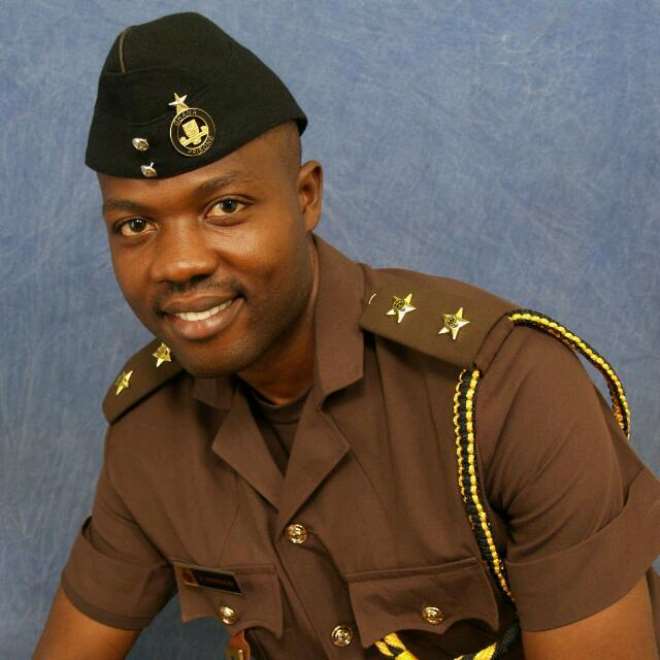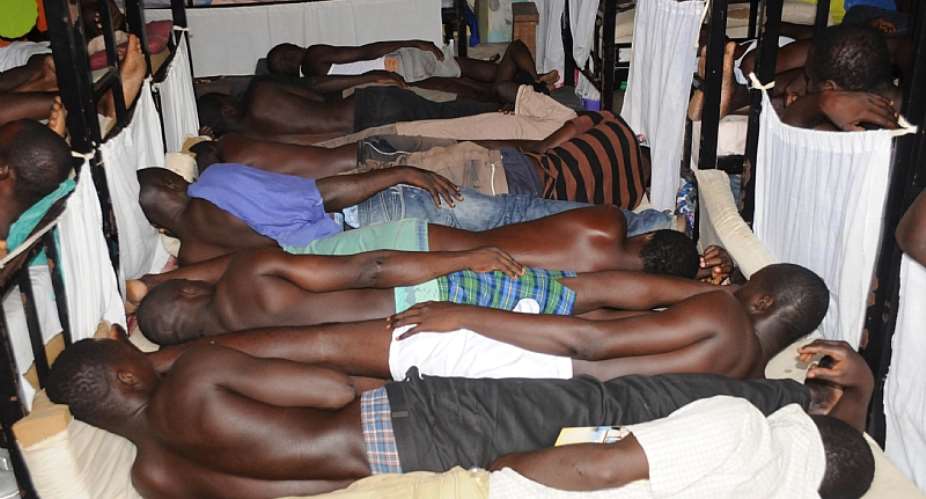The state of most prison facilities in the country leaves much to be desired due to a number of convoluted challenges confronting the Prisons Service.
Consequently, there is the need for the Service to reach out to corporate Ghana, faith-based organisations, private institutions, and individuals to contribute towards the on-going prison reforms.
The Ghana Prisons Service, as an essential component of internal security, is tasked with the mandate of ensuring safe custody, welfare, reformation and rehabilitation of prisoners whenever practicable.
Over the years, the Prisons Service has been grappling with several challenges which hamper the operations of the various 43 prison establishments housing a total inmates’ population of 14,500 across the country.
Some of the common challenges confronting Ghana’s prisons are overcrowding, limited resources for infrastructural expansion, lack of healthcare facilities, shortage of medical drugs, lack of logistics, low feeding rate of GH¢1.80p per inmate and other welfare issues, just to mention a few.
As part of measures aimed at addressing the challenges of the country’s prisons, the 6th Prisons Service Council under the Chairmanship of Rev. Dr. Stephen Wengam will launch a long-term fundraiser christened: Project “Efiase”.
“Efiase”, which is an Akan word for prison, is an initiative of the Prisons Service Council aimed at creating awareness of the deplorable state of Ghana’s prisons; as well as soliciting the support of corporate institutions, religious bodies, and well-meaning Ghanaians to improve conditions in the prisons.
The Project will be guided by a 10-year Strategic Development Plan which will be unveiled at the launch. The launch of Project “Efiase” is slated for Tuesday, June 30, 2015, at the College of Physicians and Surgeons Auditorium, Ridge – Accra, at 5:30pm.
To explain this further, the objective of Project “Efiase” is carved in three-fold. Firstly, as an advocacy drive about the inhumane condition of Ghana’s prisons; secondly, to engage the Service in private-public partnership; lastly, as a fundraiser for improved conditions in the prisons.
Subsequently, the advocacy for prison reforms will, among others, re-orient the perception of the wider society where prisoners are often labeled as criminals. Undoubtedly, this notion is erroneous because some innocent persons find themselves in prison by accident.
This all-important Project seeks to transform Ghanaian prisons into excellent centres of corrections, so as to meet the United Nations Standard Minimum Rules for the Treatment of Prisoners (SMRs) as a country.
The recent documentary on prisons titled: “Locked and Forgotten” by a senior broadcast journalist, Seth Kwame Boateng from the Multimedia Group (Joy TV), gives a clear picture about the deplorable state of Ghana’s prisons.
In the United Kingdom, the wider communities have the passion to donate towards the wellbeing of prison inmates. As a result, there are many charitable organisations in the UK that offer training, employment and financial assistance to ex-convicts.
Even though Government of Ghana deserves commendation for its continued support to the prisons over the years, there is more to be done. This is because government budgetary allocation to the Prisons Service, alone, cannot transform our prisons to attain international standard of corrections.
His Excellency is likely to make history as the first sitting Ghanaian president to visit the prisons. It is welcoming news that President Mahama has accepted an invitation from the Prisons Service Council to grace the launch of Project “Efiase” as Special Guest.
After the President’s visit to some selected prisons, it’s expected that government will be well informed about the terrible state of the country’s prisons in order to commit more resources towards addressing the perennial challenges bedeviling the Ghana Prisons.
In this 21st Century, the internationally acceptable prison system is centred on corrections and rehabilitation, since crime is likened to a disease that needs to be treated.
Currently, the prisons are holding convicts and suspects from all walks of life, and by misfortune anybody at all can find him or herself in jail. Sadly, most prisoners live in inhumane conditions.
There are many people in prison custody who need help. What is society doing to support the unfortunate ones in jail? The Holy Book admonishes us to visit people in prison, so let’s demonstrate the love of God to people in the prisons.
If we show love to prison inmates, this will facilitate their successful integration back into society. The Ghanaian populace can, then, be assured of public safety once prisoners are well reformed. This will also reduce crime rate to the barest minimum.
The stakeholders of the Criminal Justice System should expedite the implementation of non-custodial sentencing policy which will serve as alternative to imprisonment. The passing into law non-custodial sentences such as community service, parole, probation, and fine, will reduce stigmatisation of ex-convicts.
Ideally, this will prevent first and minor offenders from associating with hardened criminals who are likely to influence them negatively.
Admittedly, people are thrown into prison for minor offences simply because there are no alternatives of punishment other than the conventional custodial sentencing. A situation that accounts for excessive congestion in Ghana’s prisons.
Most of the country’s prisons like Nsawam, Kumasi, Sunyani, Navrongo, Sekondi, Tarkwa, and Tamale are heavily overcrowded, since these facilities accommodate more than 150% of the intended capacity.
According to Henry Miller, a 20th Century American writer, “The prisoner is not the one who has committed a crime, but the one who clings to his crime and lives it over and over”. In other words, every prisoner most especially first offenders need a second chance.
By way of their corporate social responsibility, the banks, telecoms, oil companies, private institutions, religious organisations, and embassies/consulates should support the Prisons Service Council in rolling prison reforms nationwide.
Security is everyone’s business, so let’s donate to support Project ‘Efiase’ for improved conditions in Ghana’s prisons. We should not wait until a tragedy hits our prisons before we respond to this call. “A stitch in time saves nine”.
ASP James Annan
Head of Publications
Prisons Headquarters, Accra
[email protected]
 OVERCROWDING IS A MAJOR CHALLENGE IN OUR PRISONS
OVERCROWDING IS A MAJOR CHALLENGE IN OUR PRISONS
 THE PAIN OF IMPRISONMENT IS DEPRIVATION OF FREEDOM
THE PAIN OF IMPRISONMENT IS DEPRIVATION OF FREEDOM
 THE WRITER (ASP JAMES ANNAN)
THE WRITER (ASP JAMES ANNAN)





 Former Kotoko Player George Asare elected SRC President at PUG Law Faculty
Former Kotoko Player George Asare elected SRC President at PUG Law Faculty
 2024 elections: Consider ‘dumsor’ when casting your votes; NPP deserves less — P...
2024 elections: Consider ‘dumsor’ when casting your votes; NPP deserves less — P...
 You have no grounds to call Mahama incompetent; you’ve failed — Prof. Marfo blas...
You have no grounds to call Mahama incompetent; you’ve failed — Prof. Marfo blas...
 2024 elections: NPP creates better policies for people like us; we’ll vote for B...
2024 elections: NPP creates better policies for people like us; we’ll vote for B...
 Don’t exchange your life for wealth; a sparkle of fire can be your end — Gender ...
Don’t exchange your life for wealth; a sparkle of fire can be your end — Gender ...
 Ghana’s newly installed Poland train reportedly involved in accident while on a ...
Ghana’s newly installed Poland train reportedly involved in accident while on a ...
 Chieftaincy disputes: Government imposes 4pm to 7am curfew on Sampa township
Chieftaincy disputes: Government imposes 4pm to 7am curfew on Sampa township
 Franklin Cudjoe fumes at unaccountable wasteful executive living large at the ex...
Franklin Cudjoe fumes at unaccountable wasteful executive living large at the ex...
 I'll 'stoop too low' for votes; I'm never moved by your propaganda — Oquaye Jnr ...
I'll 'stoop too low' for votes; I'm never moved by your propaganda — Oquaye Jnr ...
 Kumasi Thermal Plant commissioning: I pray God opens the eyes of leaders who don...
Kumasi Thermal Plant commissioning: I pray God opens the eyes of leaders who don...
